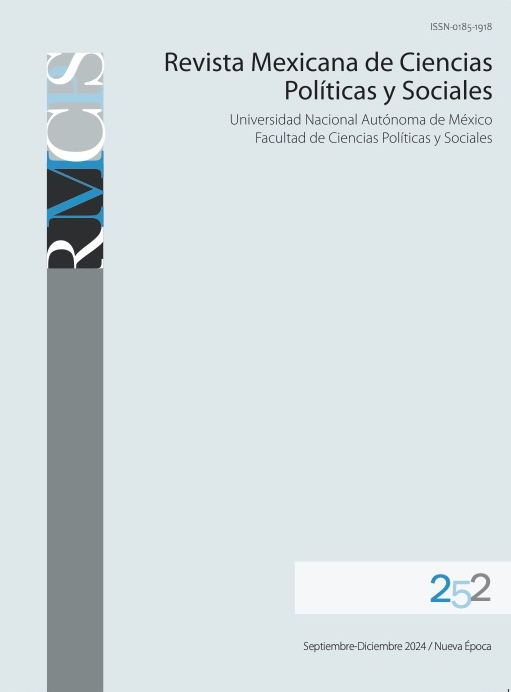Global Hegemony in the 21st Century: Bifurcations in the Face of the Global Constellation of Crisis
Main Article Content
Abstract
The questions surrounding the situation of global hegemony in the first two decades of the 21st century have been multiple and increasingly recurrent. The position of the United States as a superpower has shown an increasing vulnerability due to its internal social and economic contradictions, as well as the renewal of global geostrategic competition. The crisis of hegemony has not only been expressed in the sphere of competition between hegemonic subjects, but fundamentally through the signs of exhaustion in the capacity of management, organization and execution of the capitalist system as a civilizing horizon throughout the planet. Thus, the new century begins as a historical moment in which we witness a profound crisis of hegemony, expressed mainly in the tensions and contradictions inherent to its systemic reproduction, where possibilities of bifurcation open up to rethink the relational category of hegemony at its different scales. This article will seek to contribute to the reflection on hegemony as a relational category, which is in constant transformation and adaptation to its own conditions of possibility, with the aim of proposing lines of analysis for the understanding of a complex, uncertain, risky and unequal world where the contemporary crisis of hegemony uncovers the possibility of strategic rearticulations and systemic bifurcations in struggle for a new civilizing horizon on a global scale.
Downloads
Article Details
Citas en Dimensions Service
References
Agnew, John y Stuart Corbridge (1995) Mastering Space. Hegemony, territory and international political economy. Routledge.
Beck, Ulrich (2017) La sociedad del riesgo. Paidós.
Bensaid, Daniel (2010) Cambiar el mundo. Biblioteca Pensamiento Crítico.
Brzezinski, Zbigniew (2015) El gran tablero mundial. La primacía americana y sus imperativos geoestratégicos. Paidós.
Castillo Morales, Diana Ninoshka (2016) “La concepción china de las relaciones internacionales” Revista de Relaciones Internacionales de la unam (125): 61-92.
Ceceña, Ana Esther (2004) “Estrategias de construcción de una hegemonía sin límites” en Ceceña, Ana Esther (coord.) Hegemonías y emancipaciones en el siglo xxi. clacso, pp. 37-58.
Cox, Robert (2013) “Fuerzas sociales, estados y órdenes mundiales: Más allá de la Teoría de Relaciones Internacionales” Relaciones Internacionales (24): 129-162.
Cox, Robert (2016) “Gramsci, hegemonía y relaciones internacionales. Un ensayo sobre el método” Relaciones Internacionales (31): 137-203.
Eagleton, Terry (1997) Ideología. Una introducción. Paidós.
Echeverría, Bolívar (2011) “La modernidad ‘americana’: claves para su comprensión” en Antología. Crítica de la modernidad capitalista. Vicepresidencia del Estado Plurinacional de Bolivia, La Paz, pp. 259-286.
Herrera Santana, David (2012) “La política es la continuación de la guerra por otros medios: hegemonía y poder en las relaciones internacionales del siglo xxi” Escenarios xxi, 2(13): 5-19.
Herrera Santana, David (2013) “La teoría, las relaciones internacionales y las grandes transformaciones mundiales en el siglo xxi” Revista de Relaciones Internacionales de la unam (117): 11-37.
Herrera Santana, David (2017) Hegemonía, poder y crisis. Bifurcación, espacialidad estratégica y grandes transformaciones globales en el siglo xxi. Ediciones Monosílabo/unam.
Herrera Santana, David (2020) El siglo del americanismo. Akal.
Herrera Santana, David; Rico Becerra, Cesari Irwing; González Luna, Fabián y Federico Saracho López (2020) Espacios Negativos. Praxis y antipraxis. Akal.
Laclau, Ernesto y Chantal Mouffe (2011) Hegemonía y estrategia socialista. Hacia una radicalización de la democracia. fce.
Pereira, Juan Carlos (2013) Diccionario de relaciones internacionales y política exterior. Ariel.
Pérez Tagle, Jesús Antonio (2022) “La hegemonía de Estados Unidos: una propuesta conceptual” Iztapalapa Revista de Ciencias Sociales y Humanidades, 43(93): 197-228.
Wallerstein, Immanuel (2004) Análisis de sistemas-mundo. Una introducción. Siglo xxi.
Žižek, Slavoj (2015) El año que soñamos peligrosamente. Akal.

La Revista Mexicana de Ciencias Políticas y Sociales publicada por la Universidad Nacional Autónoma de México se distribuye bajo una Licencia Creative Commons Atribución-NoComercial-SinDerivar 4.0 Internacional.
Basada en una obra en http://www.revistas.unam.mx/index.php/rmcpys/
La RMCPyS autoriza a sus colaboradores que suban una copia de sus trabajos publicados en sus webs personales o en cualquier repositorio de acceso abierto, siempre y cuando se mencione específicamente a la Revista Mexicana de Ciencias Políticas y Sociales como fuente original de procedencia, citando el año y número del ejemplar respectivo y añadiendo el enlace a la página web donde este órgano editorial puede ser consultado in toto, de manera abierta y gratuita en: <www.revistas.unam.mx/index.php/rmcpys>.
Las y los lectores tienen libertad para:
Compartir, copiar y redistribuir el material en cualquier medio o formato.
El licenciante no puede revocar estas libertades en tanto usted siga los términos de la licencia.
De acuerdo con los siguientes términos:
- Atribución: la/el lector/a debe reconocer el crédito de una obra de manera adecuada, proporcionar un enlace a la licencia, e indicar si se han realizado cambios. Puede hacerlo en cualquier forma razonable, pero no de forma tal que sugiera que tiene el apoyo del licenciante o lo recibe por el uso que hace.
- No comercial: la/el lector/a no puede hacer uso del material con fines comerciales.
- Si se mezcla, transforma o se desarrolla a partir de la obra licenciada, no se permite la distribución del material modificado.
Cargos por gestión de artículos
La Revista Mexicana de Ciencias Políticas y Sociales NO cobra tarifas por recibir, procesar o publicar los artículos (Article Processing Charge [APC]) enviados por los autores.





